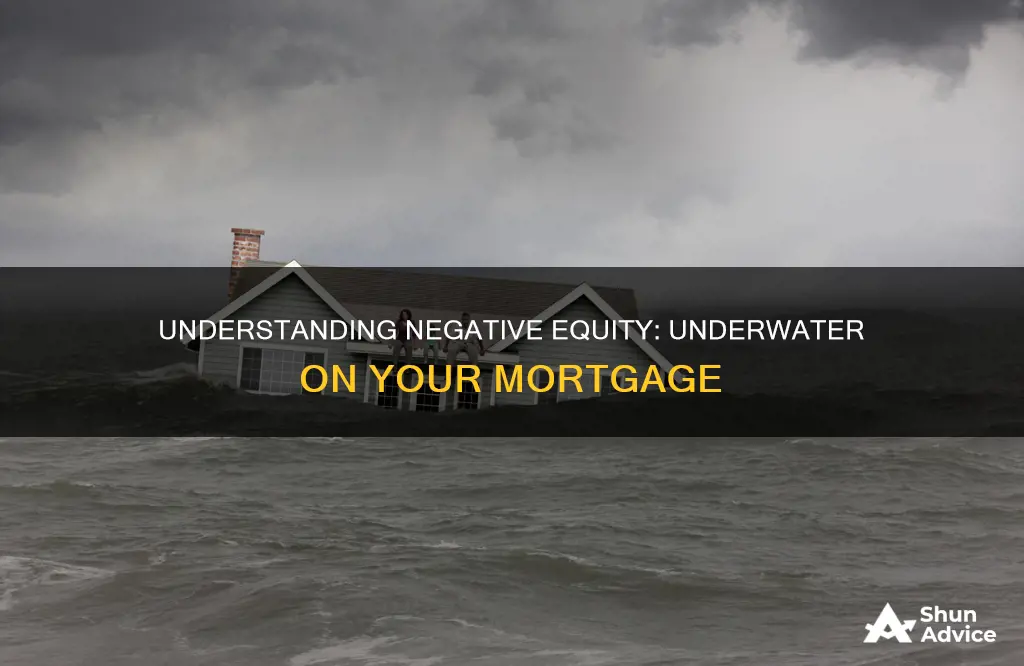
An underwater mortgage is a scary prospect for homeowners, and it occurs when the principal on the homeowner's loan is greater than the home's value. In other words, the homeowner owes more than the property is worth. This situation can be caused by a decrease in property value or missed payments, and it can make it difficult to sell the home or refinance the loan. During an economic downturn, such as the 2008 financial crisis, the risk of homeowners ending up underwater on their mortgages increases. However, it's important to note that simply being underwater on a mortgage won't impact your credit score, but walking away from the loan or accepting a short sale or foreclosure will. Homeowners facing this challenge have various options, including staying in the home, continuing to make payments, and waiting for market conditions to improve.
Characteristics and Values of Underwater Mortgage
| Characteristics | Values |
|---|---|
| Definition | A mortgage loan that’s more than the current value of the property |
| Other Names | Negative equity, upside-down mortgage |
| Occurrence | Not common, but depends on where you live. Mississippi has the most homes that are seriously underwater at more than 12% |
| Causes | Falling property values, borrowers falling behind on loan payments, economic downturns, inflation, recession, job loss, high interest, large loan amounts |
| Effects | Difficulty in selling the property, inability to refinance, higher chance of foreclosure |
| Options | Stay in the home and make payments, sell the home, refinance, short sale, bankruptcy, loan modifications, underwater loan relief |
What You'll Learn

The risk of being underwater on your mortgage
Being underwater on your mortgage means owing more on your mortgage than your home is worth. This situation, also known as having negative equity, can occur due to falling property values or borrowers falling behind on loan payments. While being underwater on your mortgage does not impact your credit score, it can have other financial implications and risks.
One risk of being underwater on your mortgage is the difficulty in selling your home. In a typical home-selling process, the sale proceeds are used to pay off the existing mortgage. However, when you are underwater, the sale may not generate enough money to cover the outstanding principal. As a result, you may need to cover the remaining balance from your savings or apply for a short sale, where the lender agrees to accept less than the total mortgage balance. A short sale can harm your credit score and may not be a desirable option for homeowners.
Another risk of being underwater is the increased possibility of foreclosure. When a home is underwater, there is a higher chance of it going into foreclosure if the payments become unmanageable. Foreclosure occurs when the borrower falls too far behind on their payments, and the lender seizes the home. This is considered a drastic option and can significantly impact an individual's creditworthiness in the future.
Additionally, being underwater on your mortgage can limit your ability to refinance. Refinancing involves replacing an existing loan with a new one, typically to obtain more favourable terms. However, most lenders require a minimum level of equity, usually around 20%, to qualify for a standard refinance. Without sufficient equity, homeowners may struggle to refinance their mortgages.
To mitigate the risks associated with being underwater on your mortgage, it is essential to understand the financial options available. These may include continuing to live in the home and making payments to build equity, seeking loan modifications, or exploring government relief programs designed to assist homeowners in such situations.
Single Homeowners: Strategies for Affording a Mortgage
You may want to see also

What to do if you're underwater on your mortgage
If you are underwater on your mortgage, it means you owe more on your mortgage than your home is worth. This situation can be stressful for homeowners, particularly if you want to sell your property or refinance. Here are some options to consider if you find yourself in this situation:
Stay in your home and continue to make payments
If you can afford to stay in your home, continue making payments to reduce the principal balance on the loan. This option requires patience and discipline, and you may need to increase your income or cut down your expenses to make the payments. By staying in your home, you can benefit from potential improvements in market conditions, which may drive your home's value back up.
Refinance
Refinancing your mortgage may be an option to help reduce your mortgage rate or change your interest structure. However, most lenders won't allow traditional refinancing until you have at least 20% equity in your home. You may qualify for specific refinance programs, such as the Freddie Mac Enhanced Relief Refinance or the Home Affordability Refinance Program (HARP), designed to assist homeowners in challenging financial situations.
Sell your home
Selling your home when you are underwater on your mortgage can be challenging, as you may not make enough from the sale to cover your mortgage balance. If you have the financial means to cover the difference between the sale price and the amount you owe, you can sell your home through a traditional home-selling process. Alternatively, you can apply for a short sale, where the lender agrees to accept less than the total remaining mortgage balance. However, it is important to note that a short sale will harm your credit score.
Loan modifications
You may want to explore the possibility of loan modifications with your lender to adjust the terms of your loan and make it more affordable.
Avoid foreclosure
Being underwater on your mortgage increases your risk of foreclosure, but there are ways to avoid it. You could qualify for underwater loan relief, which would allow you to keep your home. Maintaining regular payments and seeking alternative income sources or financial support can help prevent foreclosure.
Seek financial advice
Speaking with a financial advisor can help you understand your options and determine a financial strategy that best suits your circumstances. They can guide you through the potential risks and benefits of each option and provide personalised advice.
Remember, being underwater on your mortgage is a challenging situation, but you have options to improve your financial outlook. Carefully consider your choices, and don't be afraid to seek professional advice and support.
Verifying Primary Residence: What Mortgage Lenders Need to Know
You may want to see also

How to avoid going underwater on your mortgage
An underwater mortgage, also known as having negative equity, is when the principal of your mortgage is higher than the value of your home. This can happen when property values fall, but you still need to repay the original balance of your loan. While being underwater on your mortgage doesn't impact your credit score, it can cause issues if you need to sell your property or refinance. Here are some ways to avoid going underwater on your mortgage:
Make a Higher Down Payment
When purchasing a home, try to make a higher down payment. This will reduce the amount you need to borrow, decreasing the likelihood of your mortgage becoming underwater.
Plan to Stay in Your Home for Several Years
Avoid buying a home if you think you may need to move in a year or two. The costs of buying and selling a home within a short period can be significant, and you may end up losing money if the market takes a dip.
Avoid Taking Out Large Second Mortgages
Taking out a second mortgage that depletes your ownership stake or borrowing more than 100% of the value of your home can increase the risk of your mortgage becoming underwater.
Keep Up with Your Mortgage Payments
Falling behind on your monthly mortgage payments can cause your mortgage to go underwater. Stay on top of your payments to avoid this issue.
Monitor Market Conditions
Keep an eye on property values in your area. If you notice a downward trend, be cautious about taking out a new mortgage or refinancing. It may be wiser to wait for the market to recover before making any significant decisions.
Consider Refinancing Options
If you are concerned about your mortgage becoming underwater, explore refinancing options. The Freddie Mac Enhanced Relief Refinance program, for example, can help you reduce your mortgage rate or change your interest structure.
FHA Mortgage Assumption: What You Need to Know
You may want to see also

The impact of refinancing or selling when underwater
If you are underwater on your mortgage, you may find it difficult to refinance or sell your home. In terms of refinancing, most lenders require you to have some equity in your property before you can refinance. This can be challenging for those with negative equity, as they have nothing to draw against. Even if you find a loan that allows you to refinance 100% of your home's value, the new loan may not fully repay the underwater one, and you will have to pay the difference in cash.
Government-backed loans, such as the FHA Streamline Refinance Program, may still allow you to refinance if your mortgage is underwater. This program does not require an appraisal, so you can refinance even with negative equity. The Freddie Mac Enhanced Relief RefinanceSM program is another option for those whose loans are backed by Freddie Mac and who meet certain other criteria. This program can help lower your mortgage rate and monthly payments or allow you to build equity faster with a shorter repayment period.
Selling a home with an underwater mortgage can also be challenging. If the sale proceeds are insufficient to cover the remaining mortgage balance, you will be responsible for making up the difference. One option in this scenario is to apply for a short sale, where the lender agrees to accept less than the total remaining balance. However, this will harm your credit score. Alternatively, you can choose to stay in your home, continue making payments, and wait for property values to rise.
Employment Verification: A Crucial Step in Mortgage Approval
You may want to see also

The impact of an underwater mortgage on your credit score
An underwater mortgage, also known as an upside-down mortgage or having negative home equity, is a home loan with a principal balance that exceeds the value of the home. In other words, you owe the lender more than what the property is worth. This situation can occur when property values are falling, and it can have a significant impact on your financial situation and creditworthiness.
Firstly, it's important to understand how mortgages end up underwater. The two main causes are a decrease in property value or missed payments. When the value of a home decreases significantly after a borrower takes out a mortgage, the loan can be considered underwater if the principal on the loan is higher than the home's current market value. This can happen during an economic downturn or a widespread decline in property values.
Now, let's discuss the impact of an underwater mortgage on your credit score. Simply having an underwater mortgage will not directly affect your credit score. However, the challenges that arise due to this situation can lead to negative consequences for your creditworthiness. If you are unable to keep up with your mortgage payments and fall too far behind, you may face foreclosure, which will severely damage your credit score and remain on your credit report for up to 10 years.
Another option that homeowners sometimes consider is a short sale, where the lender agrees to accept less than the total remaining mortgage balance from the sale proceeds. While this can help you avoid foreclosure, it will still harm your credit score, although not as severely. Additionally, the process of a short sale can be lengthy, and you may rack up late payment fees during this period, further damaging your creditworthiness.
If you decide to remain in your home, you may need to wait for the market to improve, which could take months or even years. During this time, it's crucial to continue making timely payments to maintain your credit score.
In summary, while an underwater mortgage itself does not impact your credit score, the decisions and outcomes that arise from this situation can have significant credit implications. These include the risk of foreclosure, short sales, and the challenge of keeping up with timely payments.
Becoming a Mortgage Originator: Steps to Success
You may want to see also
Frequently asked questions
Being underwater on your mortgage means owing more on your mortgage than your home is worth. This is also known as having negative equity.
There are two main ways that mortgages end up underwater: a decrease in property value or missed payments. A widespread decline in property values can cause mortgages to become underwater. This can be due to a variety of factors, such as a recession or other economic downturn, or a lack of demand in the area.
If you're underwater on your mortgage, you have several options. You can continue to live in your home and make payments, building equity over time. You can try to sell your home, but you may lose money or damage your credit score, and you may still owe money on your mortgage after the sale. You could also consider refinancing your mortgage to get more favourable terms, or applying for a short sale, although this will also harm your credit score.







